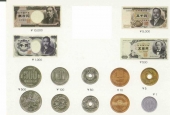Cool- Kyoto is a website in which covers information on Hotels, tour,food,shopping,sightseeing,and more. You are experiencing Japan without even visiting!
 Welcome,Guest User
Welcome,Guest User
Home > Currency & Foreign Exchange
Cool- Kyoto is a website in which covers information on Hotels, tour,food,shopping,sightseeing,and more. You are experiencing Japan without even visiting!
Home > Currency & Foreign Exchange
Japan has a reputation of being a cash-based society, but trends have gradually been changing, and there has been a significant increase in the acceptance of other payment methods. Below are the modes of payment that you might use when visiting Japan.
Cash is still the preferred payment method, especially when it involves small amounts. Big bills are readily used and accepted in Japan;; you are unlikely to be frowned upon for using a 10,000 yen bill to pay even for low-cost items, although smaller denominations are appreciated for payments made in taxis, smaller shops, temples and shrines. The likelihood that credit cards are accepted decreases in small cities and towns, and thus it is advisable to keep cash at hand when visiting rural areas.
Cash is usually the only way to pay for small entrance fees at tourist sights, at smaller restaurants and small shops. The majority of lockers also require coins. Preparing coins in advance when using buses and trams is a good idea. Buses generally do not accept bills above 1000 yen, and the bus driver may not carry any larger bills. Vending machines typically accept 10, 50, 100 and 500 yen coins and 1,000 yen bills. Newer machines typically also accept 5,000 and 10,000 yen bills.

Notes
bank notes are available in denominations of 1,000, 2,000, 5,000 and 10,000 yen.
Coins
Coins are available in denominations of 1, 5, 10, 50, 100 and 500 yen.
There is an increased acceptance of credit and debit cards, especially in big cities. Most hotels accept payment by credit cards nowadays, as do most department stores, mid to high end restaurants, outlet malls and large retail shops. In addition, many train stations, convenience stores, supermarkets, chain restaurants and boutiques also accept them.
IC cards, such Suica and Icoca, are a stored value cards which can be recharged. Primarily a tool for convenient payment of train and bus fares, IC cards now double as a means of payment at an increasing number of shops and restaurants, especially in and around train stations, at most convenience stores, many chain restaurants, numerous vending machines and some lockers in big cities.
In Japan, currency exchange is usually handled by banks, post offices, some larger hotels and a handful of licensed money changers found especially at international airports.
Whether or not it is better to change for yen before coming into Japan depends on the currency that you hold. For example, the US dollar is a highly traded foreign currency in Japan, and partly for this reason you might get a favorable rate if you change US dollars into yen in Japan. On the other hand, in some Southeast Asian countries, the foreign exchange market is very competitive and money changers take a smaller cut, therefore it might be better to do the exchange there before coming into Japan. Also you can exchange at Major airport.
Many ATMs in Japan do not accept cards that are issued outside of Japan. The big exception are the ATMs found at the over 20,000 post offices and over 10,000 7-Eleven convenience stores across the country. Exchange rates offered at ATMs tend to be competitive, but service fees vary widely depending on the card. Inquire with your card issuer in advance. Note that many ATMs in Japan are out of service during the night, and some are unavailable on weekends.
Traveler's Checks (T/C) tend to yield a more favorable exchange rate than the above two methods. The shortfall is the trouble of having to obtain them in your home country before you travel and then having to locate a place to change them in Japan. Whether you are getting more value for your money depends on your home currency and if your bank charges fees to issue the checks. Note that T/Cs are accepted in very limited currencies in Japan. International airports and leading banks are generally where you can change your T/C for yen.